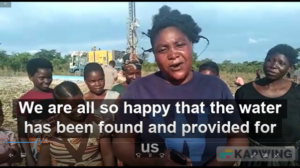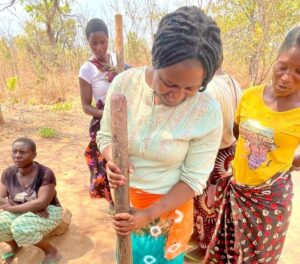by Rabbi Micha Odenheimer
For many of us nourished and inspired by the integrity and spiritual depth of the Orthodox tradition at its best, how to apply Torah to meta-issues which are not in an obvious way legislated by Halacha and codified in the Shulchan Aruch is a burning, urgent question. The subject of this essay—developing a Jewish ethical stance towards poor farmers in the Global South—evokes this question in two ways. First of all, can specific legislation from the Torah, directed as it was to an agrarian society in a remote historical era, help us think through contemporary issues of poverty and the environment? And secondly, can mitzvot which were, at their origin, meant only for Israelite society guide us in the global and universal human arena?
Torah as a Guide for the World
Fully exploring these questions is beyond the scope of this essay, but its important at least to acknowledge them, hiding as they are in clear sight. There are ample sources in the Jewish tradition, both ancient and contemporary, to support the notion that the Jewish ethical imagination includes all of humanity in its vision and embrace. So, for example, Rabbi Yehuda Ashlag, perhaps the 20th century’s most influential Kabbalist, makes the extension of “Love your neighbor as yourself” to include all of the peoples of the world a cornerstone of his philosophy. Also pertinent is the Baal Shem Tov’s statement that the principle of “arvut”–mutual responsibility (as in “All if Israel are responsible for one another”)–applies to non-Jews as well in regards to the 7 Noachide commandments. One of the 7 Noachide commandments to build a fair and righteous system of justice and governance. In an increasingly globalizing world, it follows, our responsibility is thus to do our part to ensure that humanity’s governing structures and conceptions are fair and just. Echoing Rav Kook’s admonishment to listen to our own inner moral compass, it seems to me that even if these source and authorities did not exist, our enmeshment and power in the global world means that we must apply our ethical tradition in the broadest possible way. If we are global in everything we do, from the food we eat to the gas we put in the car, from the clothes we wear to the stocks we own, our ethics must also be global in scope or our Judaism stands to lose something critical of its soul.
The working assumption of this essay is that Torah contains a vision for human life that can and should help guide us in thinking through contemporary challenges and issues even though circumstances have drastically changed. Norman Gottwald, a Biblical scholar on the left, said it this way: “So we are left with the logically perplexing but morally empowering paradox that the Bible is both grossly irrelevant in direct application to current economic problems and incredibly relevant in vision and principle for grasping opportunities to make the whole earth and its bounty serve the welfare of the entire human family.” Our task is thus two-fold: understanding the contemporary situation in the Global South, and teasing out of our tradition, Biblical and Rabbinic, the “incredibly relevant’ vision and principles that can guide us in choosing an ethical path.
Why Small Farmers Matter
I became aware of the centrality and significance of small farmers in the contemporary human story in Kathmandu, where the organization I founded, Tevel b’Tzedek, was first situated. Contemplating the various forms of poverty and enslavement in Kathmandu, from slums to street children to trafficked women, I came to realize that everything led back to the rural village. All over Nepal—in fact, all over the Global South—the rural village, where 70% of the population still lived, was in crisis. The most acute symptom was that many villages were not growing enough food to feed their population year round. The result was a cycle of first temporary and then permanent migration: to slums, to factories where the work and living conditions were injurious to human health and dignity, or to menial jobs abroad, separated from family for years at a time, deprived of civil and political rights. Leaving villages meant abandoning community and culture for anonymity. Exile from community, for rural Nepalis and many others, meant leaving a place where you had some voice in local and regional politics for a situation where you were completely powerless.
The crisis of the rural village , I discovered, was arguably the root cause of poverty in the Global South. 1.5 billion people are part of small farming families, and another billion depend on these farms for food–the majority of the population in Asia and Africa. The international definition of small farmers are those who own 10 Hectares (about 25 acres) of land or less, but most small farmers work much smaller plots—often less even than an acre.
The profound sadness of exile is, of course, one of the profound enduring themes of the Torah, from the expulsion of Adam and Eve from the Garden of Eden to Jeremiah’s lament for the people of Judea.
Is this enough of a reason to care about the massive exile of small farmers from their land? Aren’t cities in any case the wave of the future? Don’t most small farmers want to leave their farms for the big city?And aren’t large, mechanized, mono-culture farms more effective in feeding the world then small farms?
My experience with small farming families is that what is fueling migration is force of circumstance and that most would prefer to stay in the village if they had a secure source of basic livelihood and food. Health services, education, and access to information are sometimes a pull factor in migration, but unfortunately, the great majority of those forced to leave their villages have little or no access to these services in the slums, factories, or foreign lands where they end up.
The fate of small farming communities has huge significance beyond the lives of the farmers themselves—economic, political and ecological. 80% of the food in Sub Saharan Africa and Asia is grown by small farmers. In a shifting, volatile world, the food security of the poorest nations still depends on small farmers. Although many contemporary “Green Revolution” agronomists argue that large mechanized farms produce more food per acre then small farms, that is the case only when one looks one year at a time. Over the long term, mechanized farms, with their mono-culture, dependence on fossil fuel fertilizers and chemical pesticides, deplete soil fertility. Small farms, according to U.N. reports, produce substantially more food in the long term than large farms. While 75% of the world’s food is produced through 12 plant and 5 animal species, making the world food supply “highly vulnerable to shocks” as the UN’s Food and Agriculture Organization says, small farmers are one of the key guardians of our biodiversity, storing seeds from hundreds of species and thousands of subspecies, including climate and pest resilient strains.
Large scale, corporate farming can produce many calories per acre of corn or soy, but at enormous environmental cost. In contrast to small farms, these farms are mono-culture, and need copious amounts of chemical fertilizer, herbicides and pesticides that poison the earth and water for generations. A handful of giant firms now control 75% of the world’s grain trade, chemical inputs (pesticide and herbicide), and seeds. An extensive study by the New York Times last year showed conclusively that GM seeds did not increase yields overall. Instead, GM was being used primarily in order to sell Monsanto herbicide by tweaking corn and other crops so that they would be immune to these poisons, which could then be used to destroy competing plants. Of course, the rest of the natural world is not immune to Monsanto’s herbicides; their increased use has led to wides-cale poisoning of the earth and water, with potentially disastrous results for human health. Even more fundamentally, how much power over our food system is safe to place in the hands of giant corporations, whose sole focus is continued and expanded profit?
Environmentally, small farmers have an intense and intimate relationship with soil, water and forests, and their presence on the land often prevent erosion and desertification. Small farmers rely on a magic triangle between the health of farmland, domestic animals and surrounding forests or wilderness: Villagers need the forests to bring fodder for their animals and need the animals to fertilize the farms. In Nepal, when forests were the property of the government, they were exploited for timber by private individuals and companies and often almost completely denuded, causing erosion and soil degradation. 30 years or so ago, communities were put in charge of regulating the usage of community forests; the forests have rebounded, almost miraculously. Sometimes, when well protected by strong government, wilderness thrives better in pristine isolation from man, but often, it is the presence of sustainable human community that prevents the wholesale ravaging of the wild.
The exodus of small farmers from their farms is also a major cause of instability and potential violence in Asia and in Africa. The genocides in Darfur, Sudan and in Syria, for example, would likely not have happened without the prior displacement of hundreds of thousands of small farmers because of climate change. In Sudan, the expulsion of farmers from their land by elites catalyzed the creation of the Janjaweed militias, who carried out the massacres against the Darfurians. In Syria, small farmers pouring into the cities were a significant trigger of the initial non-violent demonstrations, to which Assad’s army responded with murderous force, sparking the broader civil war. For all of these reasons—the fate of the farmer’s themselves, the impact on environment and the food system, and the connection between floods of internal refugees and civil war, the fate of small farming communities is an issue that deserves our attention and thought.
Why are Farming Villages in Crisis?
In order to understand how ethical guidance from the Torah might be relevant in shaping our thinking on small farmers, we first have to understand why villages are in crisis today. The answer is multi-dimensional, but its important to say at the outset that much has to do with policies and practices, which could, with political will and wisdom, be corrected or ameliorated.
The list of challenges facing farming villages today must begin with climate change. While urban-dwelling Westerners may already be alarmed by shifts in the weather, for the world’s 1.5 billion small farmers, these changes can make their life impossible. When weather becomes less predictable or more extreme, crops fail. In Nepal, during the monsoon, the same amount of rain falls as once did, but in short violent bursts which the earth cannot absorb. In the hill villages, this means that the springs the villages relied on for water throughout the dry season now go dry with months to go until the next big rain. Downhill, in the flat-lands, the villages, homes and crops alike, are devastated by flooding. In East Africa, drought is moving millions of pastoralists and farmers from their ancestral homes, in search of food, water and grazing land.
Other environmental factors in our ecologically challenged age have been negatively influencing small farmers for the last half-century. Moses in the book of Deuteronomy (11:10-12) tells us that the Land of Israel is not like Egypt, where the earth is watered by the Nile. Instead it is a land of micro-environments, which must be tended to constantly and sensitively—something small farmers do. As new road and technologies and new trade agreements have opened the hinterland to both local businessmen and international corporations, the logging, mining and fishing industries, as well as factories and dams built to provide them with electricity, have stripped hillsides from forests, causing erosion and desertification, and poisoned and diverted water systems. During the Green Revolution, from the mid-1960’s and onward, governments and producers pushed chemical fertilizers and pesticides to small farmers, without providing them with enough instruction on its safe use. Fertilizers and pesticides both poisoned the land, and also weakened ancient agriculture practices. All these factors together have reduced soil fertility by as much as 30% in even remote farming villages.
Two other major factors in the crisis are population growth, and international economic policy. Perhaps the most effective international humanitarian project of the last half century has been the World Health Organization’s vaccination program. Many of the diseases that used to kill children no longer do; this has resulted in population growth in many regions and thus further fragmentation of land. However, awareness and availability of family planning is now reducing population growth, especially in Asia. If villages were aided in becoming more prosperous, other jobs, in teaching, solar energy, agricultural inputs, and much more could absorb much of the increase in population.
International economic policy and trade agreements have deeply affected small farmers as well. After aggressively seeking to lend money to developing countries in the 1970’s, offering low interest and the promise of large returns on investment in industry and infrastructure, the United States raised interest rates precipitously in 1980. 1980 also marked the rise of three Western leaders who were all adherents of neo-liberal economic theory, as taught by Fredric Hayek and Milton Friedman.These leaders placed the International Monetary Fund and the World Bank in the hands of neo-liberal economists while also promoting general trade agreements which eventually morphed into the World Trade Organization.
When countries all over the global south began to default on their loans, because of the high interest and much lower returns on investment than had been predicted, the IMF bailed the countries out in return for their agreement to accept draconian Structural Adjustment Programs, which followed the economic ideas of what became known as the “Washington Consensus”. These programs required governments to cut taxes, and their budgets, especially for social services such as education, health services and agricultural extension (more on agricultural extension in a moment). SAP’s imposed a variety of measures, including the devaluation of local money, that would ensure the ease of foreign investment. One of the goals of the the Washington Consensus was to integrate the global south into the world economy, specifically by moving these countries from an emphasis on food self-reliance, which had marked policy in the post-colonial age, to growing specialty items—coffee, tropical fruits, spices—for the United States and the European market. At the same time, the United States and Europe continued their long-held policies of providing billions of dollars of subsidies to their farmers, exporting their grain and rice subsidies to developing countries at cut-rate prices, and increasing what one US undersecretary of agriculture called “agri-power, which, along with military might, is a major bulwark of the United State’s position in the world.
The accrued result of these policies has been devastating for small farmers in the global south. Agricultural extension—meaning expertise, seeds and other inputs provided by the government—is crucial if small farmers are to grow enough from small plots of land. The downsizing or elimination of these programs, because neo-liberal economists believed that government must be downsized to make way for private enterprise, crippled small farmers. Often, so did the increased presence of corporate agricultural conglomerates, which bought up land, sucked up water, and used their influence with the government to take over areas once cultivated by small farmers. Reliance on specialty items like coffee meant extreme vulnerability to fluctuations in the global market. The high cost of seeds and other inputs controlled by giant corporations has caused millions of farmers to fall into debt; over 200,000 small farmers have committed suicide in India alone since 1997, largely because of debt, and often, ironically, by swallowing pesticide. Wholesale devastation was also caused by the influx of cheap grain and other products from the West. President Clinton’s remarkable confession in this regard relates to Haiti but is valid for several dozen other countries and crops as well, from Jamaica to Malawi, from Mexico to Bangladesh: “Since 1981,” Clinton says, “the United States has followed a policy which we are now rethinking, that we rich countries that produce a lot of food should sell it to poor countries and relieve them of the burden of producing their own food, so that thank goodness they can leap directly into the industrial era. It has not worked. It may have been good for some of my rice farmers in Arkansas, but it has not worked. It was a mistake. It was a mistake that I was party to, I’m not pointing the finger at anybody. I did it. I have to live every day with the consequences of the loss of capacity to produce a rice crop in Haiti to feed those people.
The Torah on Food, Land and Basic Human Needs
In building a Torah perspective on issues of agriculture and economics, I would like to start with the following premise: Basic human need, according to the Torah, trumps considerations of ownership, profit or market. A passage in Exodus makes this quite clear, in talking about the collateral—a blanket or night-garment–given for a loan by a poor person. The lender is required to return it each night because: “It is his covering, his garment for his skin. With what shall he sleep? This passage is moving in its simplicity, telling in the fact that all the Torah needs to do is to evoke the feeling of the blanket on bare skin and to ask: “With what shall he sleep?” Of course a basic human need is more important than the right to possession of the blanket which was transferred in order to pressure the borrower into returning his loan. With what shall he sleep? How will she eat? How will they be healed? Whose heart can fail to resonate with what is obvious to the Torah: basic human needs are their own argument, with no need to justify beyond a question which doubles as an outcry.
Earlier, the Torah has contrasted, as a key part of its narrative, the economy of Egypt with what might be called G-d’s economy. The economy of Egypt is based on the centralized hoarding of food. Food serves in Egypt as capital—in fact, Joseph uses it to buy out all the remaining cattle, land and even the persons of the starving Egyptians. The Israelites—whose slavery is a consequence, it seems clear, of the centralization of power in Pharoah’s hand that Joseph helped engineer—make bricks for gigantic food storage silos. After Moses appears, Pharoah punishes the Israelites with a kind of hyper-slavery, where they have to produce their quote of bricks without the straw they were once provided with—sort of like the Charlie Chaplin mass production conveyor belt that begins to move much too fast for the worker to assemble his piece. This is an image of labor alienated not only from the laborer’s needs, but also from his capabilities.
Then comes the manna, and its main characteristic: no matter what you do, you can’t gather more than what each family member needs that day—an “omer” per person. If you try to store it, it rots. The command is given to place a jar with an omer of manna in the holy of holies, along with the Tablets, broken and whole, of the Ten Commandments. Thus the amount each person needs to eat each day, the fact that each person needs to eat each day, becomes a religious symbol par excellence. Over and above all else, to me this means that keeping in mind the basic human need to eat must be at the center of our religious consciousness.
The economic program which the Torah commands upon entry into the land integrates the values emphasized in the manna story with a society of small farmers, each with their own relatively small plot of land. There is much to say about the radical stance towards economics that emerges from the Torah’s social justice legislation—the equitable redistribution of land every 50 years, which means that harvests, not land, are all that is ever owned, the sabbatical year with its periodic repudiation of ownership, the absolute prohibition against interest, debt forgiveness every 7 years, and other commandments Remembering again Norman Gottwald’s distinction between “direct application” to current economic problems and “vision and principle” one significant take away from the Torah’s narrative and laws is that economic power, and especially food power, should be widely distributed, not concentrated in the hands of the few. Pharoah’s food power equals slavery, while the Manna, which can’t be hoarded or stored, is produced and collected in absolute equity. The Jubilee and the prohibition against interest are aimed at preventing the kind of massive control over food and livelihood that the giant monopolies that threaten to make small farmers history would have us embrace. If, in fact, a jubilee-like reform that gave land to the tiller, along with micro-credit schemes that gave small farmers access to cash with at low or no interest were instituted, much of the poverty in the global south could be overcome.
The Talmud, and in its wake the Shulchan Aruch, assimilated and even sharpened the Torah’s natural aversion to the control and manipulation of agricultural products for profit. The Talmud in Megillah, exploring the meaning of the 9th blessing in the Amidah prayer, the blessing for rain and thus an abundant year, take the interpretation in an unexpected direction. One might think that the prayer for rain would be one of the the most straightforwardly vertical of requests. After all, rain (along with birth and the revival of the dead) is one of the three things whose keys remain in G-d’s hands alone. But the blessing for rain, says Rav Alexandrai, the only sage who weighs in, is aimed at foiling speculators in basic foodstuffs. These speculators, who are called “wicked”, “ambush the poor” by taking advantage of a year of poor rainfall to create even more scarcity by buying and hoarding food. The prayer for rain is aimed at stopping the speculators before they can begin. 1500 years or so before Nobel Prize winning economist Amartya Sen, whose book “Famine” demonstrated the political and economic nature of famine, the Talmud was deeply aware that the hunger of the poor was connected at least as much to human greed as to nature’s failures.
A thousand years or so later, the Shulchan Aruch codifies the Talmud’s insight into a series of quite astounding laws. * “It is forbidden to deal commercially in the Land of Israel with (food) products that are essential for life but instead this farmer should bring from his storehouse and sell and this farmer should bring from his storehouse and sell, in order that prices remain cheap.”
*It is forbidden to store agricultural produces that are essential for life in the Land of Israel or in any place where the majority are Jews. When is this said? When one is storing foodstuffs from the marketplace, but if one stores from one’s own field that is permissible. But when there is a famine, oen must not store more than enough to feed your family for one year.
*Whosoever raises prices through speculation or stores essential foodstuffs in the land of Israel is considered (as bad) as one who lends with interest.
*One must not export essential food products out of the Land of Israel, or a places that is a majority Jewish to outside the Land of Israel, including to Syria. And not from one kingdom to another in the land of Israel. (Hoshen Mishpat 231; 23 -26)
I read the “In the Land of Israel or any place where the majority are Jews” as a practical restriction, not a mandate to confine our ethnicitize our ethics: These are laws that demands communal adherence; individual observance will not have the desired affect of keeping the price of essential foods low, thus they are relevant only in a place where Jews have majority power.
From these remarkable “halachot”one can learn, first of all that keeping food cheap enough for every one to enjoy in abundance is a basic Jewish value, and that, in the eyes of the Shulchan Aruch, (echoing the Talmud’s deep suspicion of middlemen), this means creating a direct line from local farmers to the local population. This is reinforced with by the law against exporting basic foodstuffs even to an adjacent Jewish kingdom. The dictates of the free market have their place, but not when it comes to basic human needs—their the commercial must be circumscribed.
Much thinking still needs to be done, but to this writer at least it is clear that the vision and principles of the Torah favor keeping in place a local and de-centralized food system, safe from the manipulations that are the inevitable result of large scale commercialization and the profit motive. This means that, as Jews, we should seek to support those environmental and economic measures which protect and enable small farmers. Battling climate change, deforestation and poisonous pesticides and herbicides is a must. So is encouraging food self reliance by allowing global south countries to limit food imports, which usually begin cheaply to undercut local farmers and put them out of business, but are expensive and unreliable in the long run.
Although small farmers are in crisis, climate change and other challenges can be mitigated by a wide array of techniques. We at Tevel b’Tzedek have had success in tripling the bounty of small farmers in just a few years of intensive work. Governments and international organizations should be encouraged to make agricultural instruction and aid, specifically for small farmers, a priority. Peaceful land reform, such as that which took place in South Korea and Taiwan in the 1940’s and 50’s and helped establish their economies, should be supported. So should micro-credit and micro-savings schemes that allow small farmers to access cash to invest in their land, and make them less vulnerable to market forces.
In her remarkable book, Scripture, Culture and Agriculture, Professor Ellen Davis remarks on the prophetic concern with cities, where the political and financial elite were concentrated. “What is often overlooked,” she writes, “is the extent to which the prophetic judgment of the city’s righteousness (or unrighteousness) reflects a central agrarian concern. Righteousness is a question of who controls the land that feeds the city and fuels the royal trade economy, and who works that land; A question of who has plenty to eat and drink and who does not; a question of who reaps the profits from the land’s fruitfulness.” In our day and age, replacing “royal” with corporate, these prophetic questions remain as penetrating as ever.
The Inside of the Soup
Although I have focused in this essay on the economic, political and environmental reasons to support small farmers within our food system, I wish to end by adding that there are spiritual reasons to preserve a place for the production of food which is human and intimate rather than industrial and alienated. In Avot of Rabbi Nathan, we find this striking statement: “Rabbi Ahai ben Josiah says: He who purchases grain in the market place, to what may he be likened? To an infant whose mother died, although he is taken door to door to other wet nurses, he is not satisfied.
He who buys bread in the market place, what is he like? He is as good as dead and buried.
He who eats of his own is like an infant raised at his mother’s breast.” My great teacher, Rabbi Shlomo Carlebach, put it this way: “You know the difference between eating soup in a restaurant or eating soup…I’m coming to somebody she mamash made soup for me with so much love and [she gives] it to me. We’ve learned it a thousand times. It’s very simple. The deepest question is: Are you receiving the outside of the soup or the inside of the soup? Is it mamash your soup or just soup. If I go to a restaurant and I pay five dollars for a plate of soup, it’s not really my soup. I ate it and I paid for it. If someone loves me very much and they are giving me soup, it is mamash my soup. And you know, friends, when someone gives me soup, and it’s mamash my soup, basically then I don’t need anything anymore. It’s so good. It’s so good.”
Are we raised at our mother’s breast or are we orphans, or worse? Food is not only calories and molecules. The ethics, intention, and emotions that go into producing our food are the inside story of the food, and they affect us and determine what kind of world we are living in. Standing idly by while small farmers are forced from their land into slums and factories is not an option, not if we want our human civilization to receive “the inside of the soup” that we so desperately need.







